Across the gateway of my heart
I wrote “No Thoroughfare,”
But love came laughing by, and cried:
“I enter everywhere.”
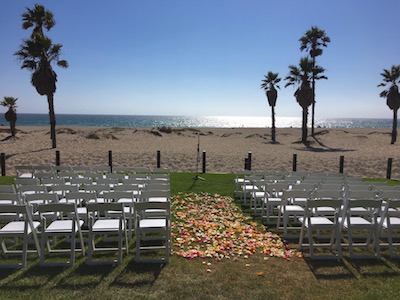
Hello again, after a bit of a break here on the blog. I’ve been on the west coast, celebrating the marriage of two young friends. Romance is everywhere, and it was fun to experience it SoCal-style!
I took along some beach reading–a teapot-collector’s mystery, courtesy of Ellen, whose Emilie Loring tea party was such a success. (Read about that here)
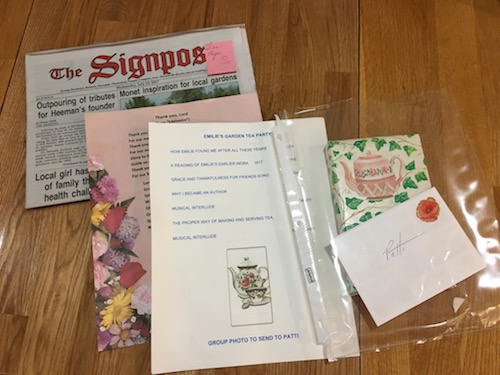
She sent the program, menu, and benediction, along with the gift for me and a copy of the article that her friend Dot wrote for the local paper, “Garden tea party a hit.”

So I sat on a wildly-colored blanket, toes in the sand, listened to the surf, and thought about summer reading. When did I first read an Emilie Loring book? On a summer train trip. I read most of the others in summertime, too, stretched across my bed at Grandma’s house or on my bunk at camp.
 The summer that Emilie Loring wrote Love Came Laughing By, she gave an interview to Doris Ricker Marston of Maine’s Lewiston Evening Journal in which she talked about her own summer reading.
The summer that Emilie Loring wrote Love Came Laughing By, she gave an interview to Doris Ricker Marston of Maine’s Lewiston Evening Journal in which she talked about her own summer reading.
During the Winter months, while she is working on the current book, she finds she cannot afford to distract her mind by much reading. However, she always subscribes to a newspaper of the place she is writing about and reads studiously about the locale, hunting for material which will give reality to the background. Summers she reads books “and more books,” while resting in Maine. Lewiston Evening Journal
She read, knitted, and worked out her next story in her mind.
Mrs. Loring can find a plot in an advertisement or the tiniest trivial incident and develop it into a story of charm and mystery. Twenty-eight times she has done it…
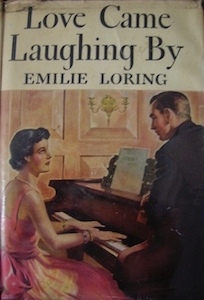 Twenty-eight was the published count when this article appeared. But the twenty-ninth, Love Came Laughing By (1949) was already off to its publisher, and Emilie was on her way to the Maine coast to read, knit, and think up her thirtieth story of “charm and mystery.”
Twenty-eight was the published count when this article appeared. But the twenty-ninth, Love Came Laughing By (1949) was already off to its publisher, and Emilie was on her way to the Maine coast to read, knit, and think up her thirtieth story of “charm and mystery.”
Love Came Laughing By begins in the Pullman car of a train bound for the nation’s capital.
Her foot was on the lowest step of the Pullman when she saw him striding toward the train. Instantly she abandoned her intention to buy a novel at the newsstand, turned, charged up the steps narrowly escaping collision with the colored man in dark blue who had started down. Love Came Laughing By

She darts into a compartment at the end of the car.
Her heart stopped, broke into quickstep. The room she had thought empty had an occupant.
The man in gray who was bending over an open briefcase on the table at the window already littered with official-looking papers straightened and glared at her. A surge of red deepened the brown of his stern face.
“What’s this? A plant?” he demanded.
The Washington Post supplied background for this story of espionage and romance. More than half of Latin American countries had changed governments by revolt in the last four years. “Where were our agents?” an editorial asked, and that was enough to suggest a story.
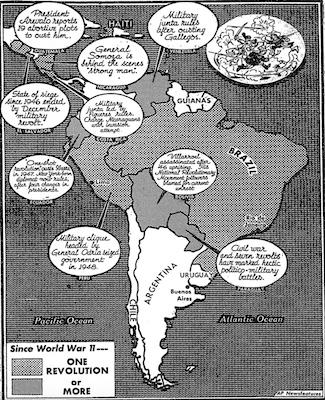
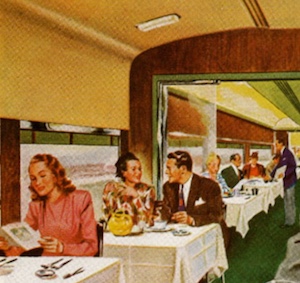 Vance Tyler, a second-term congressman from the Northwest, quickly comprehends Wendy Adair’s situation as they breakfast in the dining car.
Vance Tyler, a second-term congressman from the Northwest, quickly comprehends Wendy Adair’s situation as they breakfast in the dining car.
“You fled from a city ablaze with revolution, in that same city, a friend–interrogation point–is attached to a U. S. Embassy. You suspect you were followed after leaving the plane, discounting your beauty and charm, I can think of only one reason for your evident terror. You are carrying a message. If I can help you when we reach Washington, Mrs. John Smith–“
Wendy is caught up in a web of intrigue woven of spies, stolen jewels, and missing microfilm. Emilie’s deft writing tells the story without disturbing its mood.
A shadow cautiously stole down the path between the terraces.
The east turned pink while she tried to work out an answer.
You get the feeling that Emilie Loring had great fun creating this mystery.
“The Case of the Sleuthing Gal. What a title for E.S.G. Perhaps the celebrated writer of mystery yarns will collaborate with me.”
“E. S. G.” was Erle Stanley Gardner, best known for his character Perry Mason, whom she mentions twice more in the book.

One afternoon, a horrible discovery is made, and page by page, suspense builds.
Her eyes followed his shaking finger pointing at a large wooden box on the broad, flat desk. Her mind spun like a top, her heart stopped, for one frantic second she feared she would be sick.
Her eyes followed him to the desk, watched as he looked down. “Is–is it d-dead?”
He nodded.
“I opened it–it had been setting in this warm room quite a while, and then–and then that awful thing–” A shudder finished the sentence.
He set down the heavy case he carried. Flexed his shoulder. Picked up the cover which had been pried off. Looked into the box. For an instant he stood as if petrified. One terrified yell and he slumped to the floor.
“That was a nasty customer you shot. Propper got the impression that Crandon thought the contents of the box had been sent by an enemy.”
We’re kept waiting ten pages before its identity is revealed. If you haven’t read the book yet, better skip over this next quotation!
The comments of a popular local reporter coming through the loud-speaker above his head broke into his thoughts.
“A box, supposed to contain a rare set of Dickens, was opened and a contribution ticketed for the Zoo–a Golden Cobra–reared its ugly head and spread its hoops. While the two men present passed out in a dead faint, the daughter of the house shot the creature with her own automatic…”
The report ends with joie de vivre, and I can just imagine Emilie smiling as she wrote it:
“At last account the three gallant males were doing as well as could be expected while the charming markswoman was seen gaily dining with a prominent Congressman.”
As always, Emilie Loring wove bits of her own life into the story. Wendy Adair has a children’s radio program:
“Miss Adair, you were a smash hit. You sang as if you were singing to very special children you love.”
“I was. Believe it or not, as I sang I saw the Browns’ two little blonde girls, Sandra and Eve, part of the time I visualized a small girl-and-boy combination, Linda and Denny, neighbors at home. I wasn’t on the air, I pretended I was with them, it helped me get my music across. I love children.”
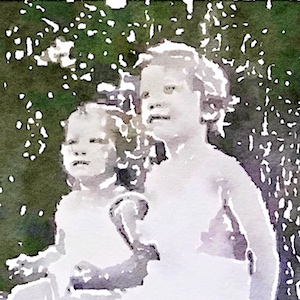
Sandra and Eve, Linda and Denny, were Emilie Loring’s grandchildren. She seldom used real names in her books, but she was nearly to the end of her thirty-book goal (see Emilie Loring’s Final Four), and she made an exception. She was about to move in with her son Robert at her old house in Wellesley Hills, and she saw her granddaughters Sandra and Eve more often. Denny and Linda were her son Selden’s younger two. They called her “Grandmama.”
“Now they’ve reached the giggling stage, you should have heard them in our room this morning, whispering and giggling, with the cat spitting and meowing protest.”
“Run down and put on your hats and coats, kiddies. Watch for Grandmama. ‘Whoo-hoo’ when she comes.”
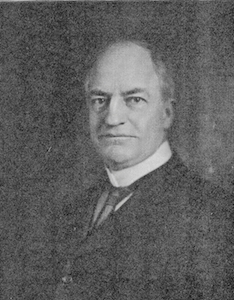
Wistful lines acknowledged how much Emilie missed her husband, Victor, who had died nearly three years before.
Her lips twitched in sympathy with his spontaneous laugh. One could love a man for that laugh alone. Perhaps it was because for two–almost three years–she had been in an environment where there was little laughter that his meant so much to her.
“That’s the Number One comfort of having a husband, Wendy, someone with whom to talk over things, things you can’t speak of to anyone else.”
But never fear for Emilie Loring!
“I’m never bored. Life is too exciting. Even with all my problems, I never feel defeated.” Love Came Laughing By
She included her optimistic, signature phrase twice, once at the beginning and once toward the end of the story.
He had planted a hasty kiss in the region of her right ear and then, as if realizing that she was going, caught her in his arms. “Happy landings,” he whispered. Was it a prophecy or only a hope, she had wondered as he dashed for the exit.
He cleared his gruff voice. “I’ll wait here till you are inside the building. Happy landings.”
But these are subtle weavings. Mystery remains uppermost in Love Came Laughing By.
If I hitch forward one more inch in this chair I’ll be on the floor, Wendy warned herself. Excitement has almost stopped my heart…
Wendy could have screamed with impatience as Rolfe Sanford paused to consult his notes. Of course he didn’t need them. Could he be waiting for a signal? A distant roll of thunder accentuated the silence. Go on! Go on! she whispered and clenched her hands on her knees.
And romance, of course. But you knew that already. Just the thing for summer reading.
“I am going to the car ahead for breakfast, there will be a seat for you at my table,” the low voice bombed her train of thought to splinters…
Why get jittery? “Big Shot, here I come,” she announced under her breath and rose.
I’ve always liked this story. I think it was the second of her books that I read, and just thinking about it brings a smile.
Do you know if any of Emilie’s knitted items are still extant? I’m curious what she made, since I knit, too.
LikeLiked by 1 person
That’s an excellent question! I’ll ask the family. I have one photo of her either knitting or sewing—I’ll have to look again. (Lorings, if you see this, go ahead and answer!)
LikeLike
Love the post, Patti!
LikeLiked by 1 person
Thanks, Vicki!
LikeLike
Hi blogger, i must say you have very interesting
articles here. Your page should go viral. You need initial traffic
boost only. How to get it? Search for; Mertiso’s tips go viral
LikeLike
One of the things I enjoy about this book is the conflict between Wendy and her mother, handled so well by Ms. Loring. Their differences and her growing fondness for her stepfather feel very real. One of my favorites.
LikeLiked by 1 person
It was unusual for her to venture so far into a divorced and step- family. I liked that aspect, too. It was open-minded and fair–ahead of her time, I think, in the 1940s. I wonder who her real-life models were?
LikeLike
I haven’t read this one, either. It’s one of the 3 I don’t have, but I’m down to reading the final 3 of the books I do have. Then, I’ll hunt for the others! I’m currently reading No Time for Love.
LikeLiked by 1 person
If my arithmetic is correct, you’ve read 44, with 3 on deck, and 3 yet to acquire. Good luck with your search!
LikeLike
Yes! And thanks. I was just looking through your list where you separated Emilie’s books from those that were ghostwritten. I believe these final 3 I have on deck are from the latter list. I love them all, but I think nearly all of my top favorites are the ones she wrote herself completely. The big exception is In Times Like These. It was the second one I read and the first I purchased. It remains one of my top favorites. My Dearest Love and Behind the Cloud are two others I really like from the second list. I think it’s all very interesting, and I haven’t really been able to tell a difference between the two sets. Of course I’ve read them only once so far, so maybe I’ll notice the differences after multiple readings. I’m wondering how much of the 3 books I mentioned were ghostwritten and how much she wrote herself.
LikeLiked by 1 person
How much she wrote and how much was ghostwritten is always the question–and there’s always the possibility of simply liking the ghostwriters’ books, even if they’re not Emilie’s in fact or style. My Dearest Love has large portions by EL, and it has always been a favorite of mine, too. I never cared much for Behind the Cloud, even though it uses some of the same base material–Alaska–as Lighted Windows. Whatever their differences, I’m happy to have such a big stack of books I can enjoy over and over again!
LikeLike
So, I’ve just finished No Time for Love, and I have to say that for the first time, I definitely could tell this wasn’t her writing. I liked the characters (the Princess was unique), and I wanted Julie and Mark to get together. Bert and Jane were great. The story line was interesting, and it got more exciting toward the end. However, there were several little things I noticed that I had issues with–things that said, “This isn’t Emilie!” The descriptions weren’t on the same level as hers, though I found one that came close, and the conversations seemed lame in comparison to the ones she actually wrote. Though I liked Julie and Mark, their romance seemed very unlikely because they were madly in love with each other after only a few brief meetings and barely speaking. I really wanted more interaction between them. Even the ending seemed a bit lame. It’s probably not one of my favorites, though I enjoyed it okay. I have 2 left to read!
LikeLike
I thought I had read this one, but I haven’t! Going over to Amazon now to hunt down a copy! It sounds like the perfect summer read. And I was just contemplating what to read next?!
LikeLiked by 1 person
This may be Emilie’s best mystery–definite summer reading potential. Let me know how you like it!
LikeLike
I finished Love Came Laughing By last week. Very fun! Plenty of different elements in this one. I thought she wrote Vance especially good. A bit more of a relaxed hero then normal. Interesting that quite a few characters say Happy Landings, usually it is only the hero that uses it.
Though I expecting a Maine location when said it was a good summer read! Lol! I certainly was caught off guard with Washington around Thanksgiving! Not that a summer read has to take place in summer, I was just expecting Maine….
LikeLiked by 1 person
I prefer Maine, for both reading and visiting, but it was a good fit for me this year, as I was in Washington, DC at the start of the summer. She was definitely in the “Happy Landings” mood. I so wonder what its origin was for her!
LikeLike